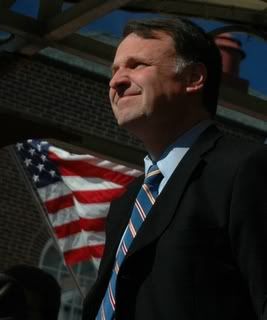 Today's Washington Post published an interesting editorial on the Deeds recount effort, showing that last week ruling may end up making the effort more complicated than expected:
Today's Washington Post published an interesting editorial on the Deeds recount effort, showing that last week ruling may end up making the effort more complicated than expected:
WOULD IT BE so difficult for Virginia election officials to arrange for a recount of all ballots cast in last month's excruciatingly tight race for attorney general? Republican Del. Robert F. McDonnell's margin of victory is so minuscule -- just 323 votes out of 1.94 million cast, or barely over one one-hundredth of 1 percent -- that the losing candidate, Democratic state Sen. R. Creigh Deeds, is automatically entitled to a recount. But according to a state circuit court order last week, roughly a quarter of the ballots are to be excluded from next week's recount, although some of them may be reexamined case by case. The three-judge panel was apparently convinced that technical problems made recounting all the ballots not worth the trouble. Perhaps the judges were also concerned that a complete recount might drag on through Christmas. Whatever their thinking, the ruling raises the risk of a clouded result.
About three-quarters of the votes on Nov. 8 for governor, lieutenant governor and attorney general were cast by touch-screen machines, leaving no paper ballots to review. Lawyers for Mr. Deeds had asked for a blanket recount of the remaining ballots, which were tabulated by optical-scan devices as well as by punch-card readers. The judges declined, ruling that if the printouts of the results are clear, they should be the basis for redetermining the vote -- unless the court decides to make exceptions and order that ballots be rerun through tabulators. The technical problem is that there is no easy way to program some of the voting machines to sort out ballots on which it appears that neither candidate for attorney general received a vote, so that they may be examined individually. About 210,000 optical-scan and punch-card ballots would have to be reviewed by hand to cull those "undervote" ballots, which would probably then be the subject of disputes between lawyers for the candidates.The judges didn't say what standard they would apply, case by case, in deciding whether to order a retabulation of the optical-scan and punch-card ballots. That casts a shadow of confusion over the recount, which is scheduled to take place Tuesday and Wednesday. The state does have a legitimate interest in avoiding a continuous recount of every election. But if the 2000 mess in Florida proved anything, it is that voting machines involving paper ballots are prone to error. That leads us to think it would be worthwhile to recount as many ballots as technically feasible. If the only way to be certain of the result is to sort through 210,000 ballots, then the state ought to do it. The alternative to a thorough recount -- confusion and doubt -- will only undercut public trust in the election of Virginia's chief legal officer.
Mr. McDonnell's attorneys adamantly oppose a retabulation of the optical-scan and punch-card ballots. But let's say that a review of the remaining, touch-screen vote reveals an error that puts Mr. Deeds slightly ahead -- not completely farfetched, given that transpositions and other mistakes were identified in the weeks after the election. You can bet that the McDonnell team would execute a speedy about-face and insist on a thorough recount of the optical-scan and punch-card ballots, just as the Deeds team is doing now. So why not agree from the start to count every vote?
This ruling may not be fair to the electorate, but it is decided. Now need is truly for vigilance. Please support the recount effort, contact Mark Bergman at mark@vademocrats.org.